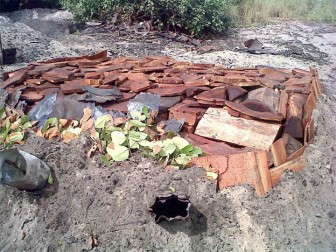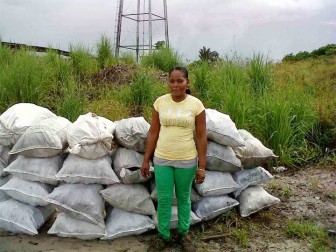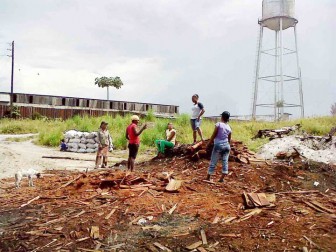The Soesdyke-Linden Highway is the location of several business enterprises that reflect the determination of Guyanese women to enhance their entrepreneurial reputations; none of these better exemplifies the spirit of entrepreneurship that which reposes in our womenfolk than the Yarowkabra Coal Burning Association, registered since February 2003 under the Friendly Societies Act.
The 28 women comprising the active members of the Association make a living by converting waste wood into coal, baking the wood in pits that are three feet deep. A small number of men are recruited to help move the wood, acquired from the nearby Howard Bulkan’s Superior Shingles, to the coal pits on the adjoining plot of land. It is a decidedly low-technology pursuit; the waste wood is moved to the pits in two wheelbarrows that have clearly seen better days, or else, on the heads or shoulders of the women. There are those who might say that burning coal is not women’s work, but the members of the Association beg to differ. It’s tough work but most of them are single parents with up to half a dozen children to provide for in some instances.

What might appear like small individual enterprises – each of the women has her independent coal pit – is actually held together by the Association. Prior to forming the Association each of these women operated their own coal pit. However, working together helps them to take advantage of economies of scale and to benefit from the mutual support that they provide for each other. Each member pays a monthly membership fee of $100 and a tariff of $10 on each bag of coal to the Association.
What goes on at this site can only be learnt through exposure. The pits are painstakingly packed with the mostly wallaba waste divided equally among the women. The objective, they say, is to bake rather than burn the wood. The packing process determines the output. The pits are then lit, covered with zinc sheets and sand and left to burn for five to seven days. The women keep watch from makeshift huts erected at the location. They monitor the process by observing the smoke emitting from the pits through pipes. Rains slow down the baking process but never bring a halt to operations. After the baking process is over the coal is packed in forty-pound sacks. The removal and packing process is undertaken by men who are paid around $3,000 per day.

In a community where paid employment is a rarity Dawn Braithwaite, the Association’s chairperson concedes that the challenges notwithstanding, coal baking could be a worthwhile business. Coal is in high demand on the local market and a 40-pound bag can fetch as much as $900. An export buyer offers the women of the Association $1,000. Buyers travel from Georgetown and other distant places to acquire coal and Braithwaite says there is never a case in which production can adequately meet market demand.
On the issue of securing a direct share of the export market she is realistic. The Association is unable even to meet its current domestic market needs though it is confident that support for upgrading its capacity can see the Association become an exporter. The limitations of the operations are obvious. The primary requirement is to begin to transform from what, currently, is a heavily labour-intensive operation to a more mechanized one. At the very least the Association needs a truck and driver to access other sites from where they can acquire wood waste for their pits. There are also concerns of operational efficiency and safety associated with the movement of wood to the burning site and the absence of protective gear. Expansion permitting, Trinidad and Tobago and Haiti are high on their list of target markets.

Tuesdays and Fridays are market days. The buyers arrive with their trucks and other forms of transport and the trading begins. Sometimes the buyers bring their own bags. Otherwise the women of the Association must buy bags from supermarkets, rice mills and nearby shops. Buyers sometimes do a brisk trade with the Association selling them the zinc sheets used to cover the burning pits.
The site receives periodic visits from the Ministry of Forestry to ensure that the correct procedures are applied in the coal-baking process and the Association is currently engaging the Department of Lands and Survey for an extension of the lease on the land which they occupy. More than that, the women say that they are urgently seeking a grant with which to refine and expand their operations in order to take advantage of a growing market for coal.




